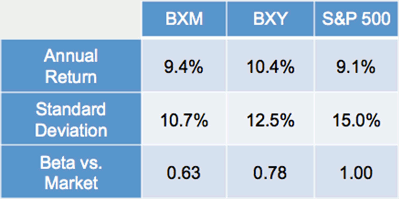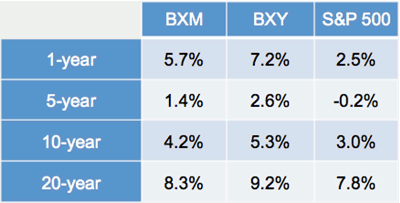Covered call writers can profit with little risk, and higher risk brings higher rewards, writes Mike Scanlin, CEO of BornToSell.com.
Covered calls are one of the most conservative, most popular, and consistent option-based income-oriented strategies around. They can be used to generate additional yield on a portfolio of equity holdings, as an alternative to low-yielding cash or bonds, or for aggressive account growth through more active management.
Additional Yield
A typical conservative portfolio
contains a diversified collection of large cap, dividend paying, blue-chip
companies. The dividend yield is probably 3% to 4%, and you have a chance for
some capital appreciation.
What many investors don't realize is that by writing out of the money call options against their portfolio, they can lower portfolio volatility and increase overall returns-without taking any additional equity risk.
For example, AT&T (T) pays a nice 5.4% annual dividend. But you can do better. By writing a covered call that is 5% out of the money with two to three months until expiration, you can earn an additional 4% a year in call premium income. You leave yourself some upside potential (max gain of 5% in two to three months) while earning a combined annualized yield over 9% (dividend plus call premium).
Alternative to Cash or Bonds
There are three problems
with today's low interest rates:
- fixed-income investors have a hard time making ends meet when they're only earning 2% or 3% a year on their portfolio of highly rated bonds
- rates won't stay low forever, and when they inevitably begin to increase, the value of bonds will fall
- it's challenging to hold cash when receiving next to zero interest
Covered calls make an excellent alternative. By writing short-term deep in the money calls on blue-chip stocks, a conservative investor can earn 6% to 9% a year without taking much equity risk. That's over three times what highly rated bonds pay. Plus, you've removed some interest-rate risk from your portfolio by selling your bonds before rates increase.
The key is to choose a well-diversified portfolio of large cap, dividend paying, blue-chip stocks and then write deep in the money covered calls (probably 5% to 10% in the money, with one to three months in duration).
Aggressive Covered Calls
Any strategy can be used
aggressively for those investors going for higher risk and higher reward.
Covered calls are no exception. By writing at-the-money options on higher beta
stocks, you can achieve returns a lot higher than 10% a year.
Of course, with higher returns comes higher risk. You don't want to choose stocks that are going to have an FDA announcement or an earnings release before the option expiration date. And you may not want to choose the latest fad or momentum-based high P/E stock.
Instead, pick a diversified set of growth stocks you believe in (they don't need to be large cap, nor do they need to pay a dividend). Then write short-term options with strike prices near the current stock price. That is how you capture the most time premium possible.
The perfect scenario is that your stocks are flat between the time you sell the option and the expiration date. If they go up, you will see little of that gain since you wrote at-the-money calls against them, but if they go down you will have some downside protection from the option premium you received.
The key is to stay well diversified, and keep the option durations short. During a significant bear market you could still lose, but during a flat or up market you should do just fine.
23-Year Results
A recently released 23-year study shows
that systematic covered call writing (BXM and BXY indices) produces higher
returns at lower volatilities than the S&P 500 benchmark:
Furthermore, this overperformance applies to just about any time frame in the last 20 years (period ending December 31, 2011):
Mike Scanlin is CEO of BornToSell.com.











